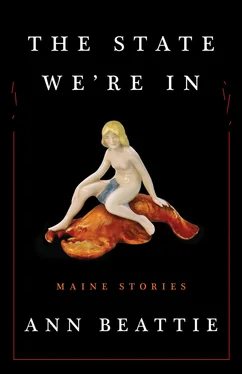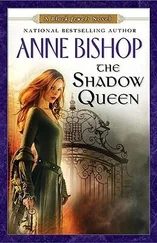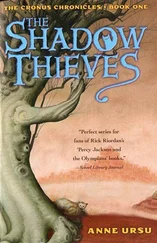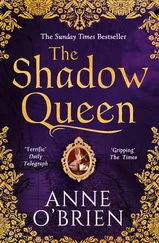“I’m quite aware of our history. We’ve now been married for nine, going on ten years. We have a wonderful son. I’m not going to apologize for the next ten years, because apologizing for the first ten has been enough, don’t you think? I was having a panic attack. All I said to you in Marin, which I still don’t think was so crazy, was that we should back off and think about the relationship for a while.”
“What would you have done if Hughes hadn’t suddenly appeared on the scene and tempted you to work for his company?”
“I wasn’t looking for a job when Hughes got in touch. Were you under the impression that I was? I was actually trying to cut down my hours and build more time into my schedule for tennis.”
“What a prig you sound like! Your tennis time! Anybody would think you were vile.”
“Vile?”
“I can’t believe what I hear sometimes. Like this is a movie of some stupid rich people’s lives. We’re really sorry the lobstermen can’t afford to live in town anymore, and it’s really too bad about all the businesses going under — or maybe the greenhouse stays open because they sell orchids, which have become the new azaleas around here — and sure, the economy is fucked. But we know all about French wines and fly first class and think about fucking tennis.”
“You, yourself, have thoughts on tennis?”
“That it would be better for me than yoga and Pilates and power walks with weights strapped on my ankles. Jesus! We’ve got to watch out.”
“Okay, you pick up those binoculars and watch out while I’m gone, and if any fashionable sports activities come this way, you hold up a hand and you say, ‘None of that here; I’m not having any kicking, or tackling, or kneeing the other guy in the balls.’ You keep the house safe, use the gun in the drawer if you have to, to keep us safe from sports, which have become terminally fashionable in your mind, I now understand.”
“What gun in what drawer?”
“I was kidding. The water pistol Hughes gave Joshua that you confiscated and keep in the kitchen drawer with the steak knives, for some reason. By the way, I was looking for an unmatched sock and opened your night table drawer and saw you had quite a bit of new La Perla. Expensive stuff!”
“You love to pretend I’m always spending money.”
“Really, sometimes you say the most ridiculous things. An aversion to tennis! It’s too crazy.”
“I don’t have an aspersion.” She blinked. Why had she said that? The same way she matter-of-factly corrected Joshua, she now corrected herself. “An aversion,” she said.
“Then call the coach tomorrow and set up a time.”
“You know I’m not going to do that.”
“You could.”
“You’d hate it if I was all over your territory. It’s one of the reasons why you left her, isn’t it? Because there wasn’t anything you didn’t do together and agree on?”
“That question can’t be answered. The way you’ve put it, I mean.”
“I don’t care if I’m childish,” she said. “I’m trapped in this horrible place with my wicked thoughts and a kid who always mixes up words and uses the wrong one, and no money of my own, and a job that’s just something to pass the time, and only you have the key to the wine cellar.”
A motorcycle passed by, the sound shaking the house. Then came another.
“Wine cellar?” he scoffed.
“Metaphorically speaking.”
“Okay,” he said. “This is you-know-what, that g word you never want me to say, and I’m not going to say it, I’m just going to give you a hug and hope you snap out of this mood very soon, even if it means you’re starkers on the porch, sipping your nonalcoholic drink that you pride yourself so much for drinking, as if I ever thought you were an alcoholic. So come here and we’ll embrace and even though I’m not saying you-know-what, you know that I’ll be back in three days, and that I love you.”
She ran into his arms. His travel bag was suspended from a padded strap over his shoulder; it swayed before steadying itself. If he had facial stubble and a tiny lock of dark hair falling over one eyebrow, he could be a Prada ad. Also, if he were twenty years younger. His black Nikes made him look less hip. The rounded toes were all wrong. Their son was still at his playdate. The house would be very empty when her husband left. She squeezed him tightly, mashed her nose against his shirt, which somehow smelled of its color: light, light green. A medium green shirt would have been unthinkable. Might as well wear loafers without socks. Or take out a membership at the Reading Room on the path above the beach — the Reading Room, where the joke was that there wasn’t a book in the entire place.
They disengaged. He raised a hand. She did the same. From under the bed, the cat poked out his head, then nearly flattened himself to crawl into the room. He walked in a half circle with his tail in the air, white tip flicking. They’d tied a bell to his collar, but the week before she’d found a dead bird in the yard.
She heard his footsteps on the stairs (or imagined them; they’d been newly carpeted), then the front door clicking shut. She waited to hear the garage door. Okay. She heard the car radio and the sound of gravel under the tires in the driveway, then only the wind that blew up. She went to the window and picked up the binoculars that sat there. She raised them to her eyes, already knowing how bright the pink of the sky would appear, how silver the bottoms of the tree leaves, pale as the underside of a turtle. A turtle some nasty boys flipped over so it would be incapacitated, as they laughed and pointed at its scaly legs clawing the air.
The cat startled her, brushing her leg. It was feeding time. A bit past it. “Feeling time,” she murmured, then did a double take and corrected herself: “Feeding time. Yes.” His eyes were all bright desire, but he wouldn’t utter a sound. You sometimes heard it other times, but only the most silent of demands was made for the nightly meal. The cat would claw the banister and his bell collar would tinkle if the request wasn’t promptly fulfilled.
Across the road was a scene she wouldn’t have noticed if the cat’s touch hadn’t made her lower the binoculars from the sky: a doe and her fawn, the mother hovering as the lanky-legged baby led the way, eating something hanging below the low leaves of a bush. The pair was listening, listening, but the doe was listening more keenly. Oh, how sad is it I have to pump myself up with my own importance? she wondered.
Suddenly conscious of her earrings, dangling pearls, she touched them lightly to still them. She swiveled to see the empty room, the ocean-intense span of blue spread across the huge bed, the dresser mirror allowing her to see behind her to the pink sky darkening above whatever scene had been happening before that was now out of sight. Was September deer season? October?
Please let the plane not crash, she thought, going weak in the knees.
This was a habitual thought. More or less like prayer.
ENDLESS RAIN INTO A PAPER CUP
It was July, Myrtis’s favorite month since school days, when it would seem the summer still stretched before you, and your tennis shoes were just the right soiled color with your toenails poking up the canvas, and the water had warmed up enough that you could swim in the ocean — though now she lived inland; there was no nearby ocean — and the hummingbirds were busily sucking nectar from the bee balm (red was the only color in the garden). The Fourth of July! Strawberries ripened in July and bathing suits went on sale. She still bought a new one every year to wear in the steam room at the gym; she hadn’t waded into the Atlantic in years, even on visits to Raleigh and Bettina. How she wished her daughter also saw summer as a magical time when the world overwhelmed you with its bounty, but Jocelyn seemed to notice little if anything about the environment in which she lived. She looked myopically at her friends, and from very close distance, they mirrored her expression of incomprehension or boredom, or they laughed about how ridiculous everything was, whether it be a buzzing bee or people working in a community garden. Her former husband’s idea of happiness and harmony with nature had been gambling amid potted plants in Atlantic City casinos.
Читать дальше












